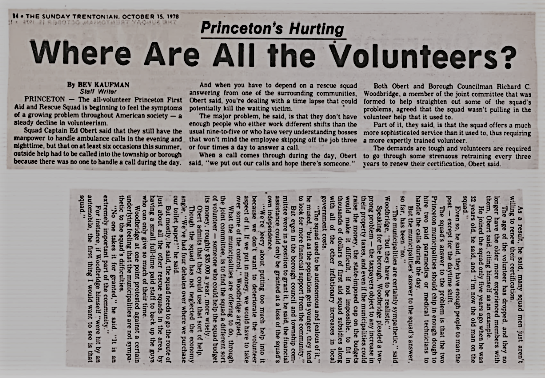
Trentonian
October 15, 1978
Princeton’s Hurting
Where Are All the Volunteers?
By BEV KAUFMAN
Staff Writer
PRINCETON – The all-volunteer Princeton First Aid and Rescue Squad is beginning to feel the symptoms of a growing problem throughout American society — a steady decline in volunteerism.
Squad Captain Ed Obert said that they still have the manpower to handle ambulance calls in the evening and nighttime, but that on at least six occasions this summer, outside help had to be called into the township or borough because there was no one to handle a call during the day.
And when you have to depend on a rescue squad answering from one of the surrounding communities, Obert said, you’re dealing with a time lapse that could potentially kill the waiting victim.
The major problem, he said, is that they don’t have enough people who either work different shifts than the usual nine-to-five or who have very understanding bosses that won’t mind the employee skipping off the job three or four times a day to answer a call.
When a call comes through during the day, Obert said, “we put out our calls and hope there’s someone.”
Both Obert and Borough Councilman Richard C. Woodbridge. a member of the Joint committee that was formed to help straighten out some of the squad’s problems, agreed that the squad wasn’t pulling in the volunteer help that it used to.
Part of it, they said, is that the squad offers a much more sophisticated service than it used to, thus requiring a more expertly trained volunteer.
The demands are tough and volunteers are required to go through some strenuous retraining every three years to renew their certification, Obert said.
As a result, he said, many squad men just aren’t willing to renew their certification.
The age of the volunteer has dropped, and they no longer have the older more experienced members with them, Obert said, citing himself as an example.
He joined the squad only five years ago when he was 32 years old, he said, and “I’m now the old man on the squad.”
Even so, he said, they have enough people to man the post — except for the daytime shift.
The squad’s answer to the problem is that the two Princeton municipalities should chip in enough dough to hire two paid paramedics or medical technicians to handle the calls during the day.
But the municipalities’ answer to the squad’s answer, so far, has been “no.”
“The municipalities are certainly sympathetic,” said Woodbridge, “but they have to be realistic.”
Speaking for the borough, Woodbridge pleaded a two- prong problem — the taxpayers object to any increase in their property taxes, and even if the municipalities could raise the money, the state-imposed cap on the budgets would make it difficult, if not impossible, to fit in thousands of dollars of first aid squad subsidies along with all of the other inflationary increases in local government costs.
“The squad used to be autonomous and jealous of it,” he mused, “but as the population gets younger, they tend to look for more financial support from the community.”
But even in the borough council and township committee were in a position to grant it, he said, the financial assistance could only be granted at a loss of the squad’s own independence.
“We’re leery about putting too much help into it because we don’t want to deteriorate the volunteer aspect of it. If we put in money, we would have to take over some of the control,” Woodbridge argued.
What the municipalities are offering to do, through the joint committee, is to find the squad a different sort of volunteer — someone who could help the squad budget its money, roughly $35,000 a year, more wisely.
Obert admits that they could use that sort of help.
Though the squad has not neglected the economy angle, “We’ve had four debates over where we purchase our toilet paper!” he said.
But mostly, he said, the squad needs to go the route of just about all the other rescue squads in the area, by having a small full-time paid staff to back up the guys who can only give so much of their time.
Woodbridge at one point protested against a certain underlying feeling that the municipalities are not sympathetic to the squad’s difficulties.
“No one takes it for granted,” he said. “It is an extremely important part of the community.”
For instance, if Woodbridge himself “were hit by an automobile, the first thing I would want to see is that squad.”